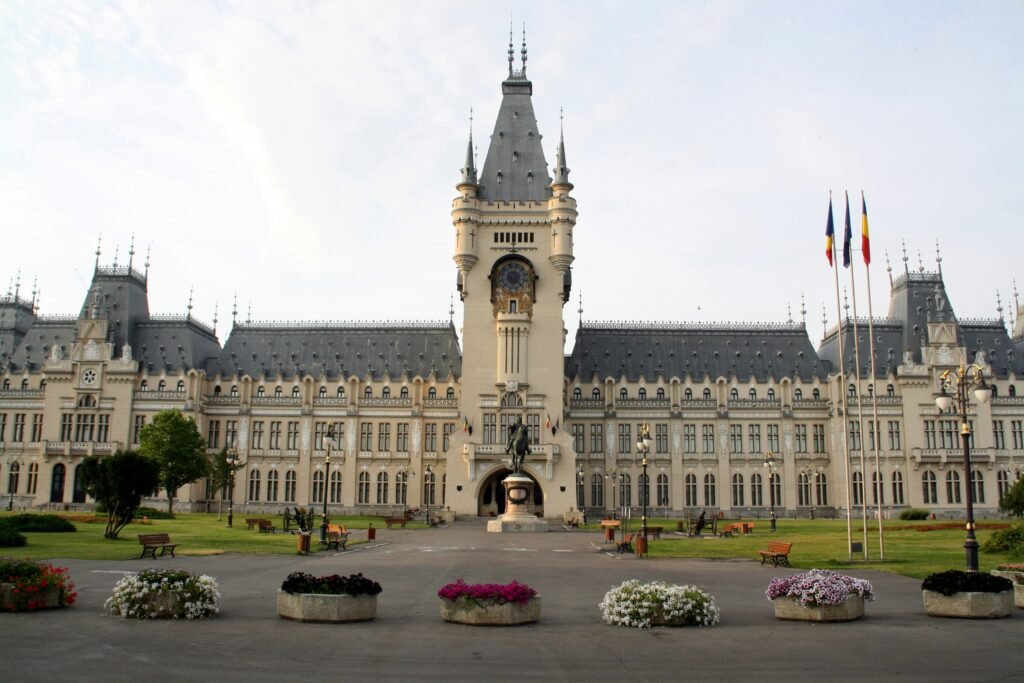🇷🇴 Ready to start a new adventure in Iași? If you’re planning a move to Iași, this comprehensive guide covers everything you need for a smooth transition.

What should I know about living in Iași at a glance?
- Flag: 🇷🇴
- Population: Around 320,000 (Iași city)
- Currency: Romanian Leu (RON)
- Average salary: Around 1,100 EUR/month (approx. 5,500 RON)
- Live ARS ←→ Dollar: Use dynamic currency converters for the latest exchange rates
- Romanian National Institute of Statistics (INSSE), 2024, insse.ro
- European Central Bank (ECB), 2024, ecb.europa.eu
- XE, 2024, xe.com
Reviewed by World Population Review, last updated in July 2025; European Central Bank, last updated in July 2025; Trading Economics, last updated in April 2025.
How Much Does It Cost to Move Your Belongings to Iași?
The cost of relocating to Iași depends on several factors, including shipment size, transport method, point of origin, and additional service fees. Below are typical market rates as of mid-2025:
| Shipment Method | Transit Time | Estimated Cost (USD) |
| 20-ft container | ~1–2 weeks | $1,100–$2,300 |
| 40-ft container | ~1–2 weeks | $2,000–$4,200 |
| Air freight (per kg) | Few days | $3.20–$7.50+ |
| Customs / Fees | — | $100–$400+ |
Reviewed by Freightos Market Analytics Team and Maersk Logistics Research Team, last updated in July 2025.
Use a real-time moving calculator for a tailored quote with ReloAdvisor.
Real-life case:
“I relocated to Iași in April 2025 with about 12 cubic meters of belongings using a shared 20-ft container. The total cost, including customs clearance and delivery to my new home in Iași, was around $1,900. The shipment arrived in about two weeks, and the moving company managed everything efficiently, making the relocation to Romania smooth and stress-free.” — Ana M., moved in April 2025
Many people relocating to Romania choose to settle in one of the five most popular cities for newcomers, including Bucharest, Cluj-Napoca, Timișoara, Iași, and Brașov. These cities offer diverse career opportunities, rich cultural experiences, efficient public transportation, and vibrant international communities.
How to understand the cost of living in Iași?
As of mid‑2025, Romania continues to offer a moderate cost of living compared with many Western European countries. In Iași, a single person’s monthly expenses excluding rent are approximately €660 (≈ US $695). Housing is one of the larger costs: a one‑bedroom apartment in the city centre averages around 2,100 lei (≈ €430) per month. While utility costs and public transport passes vary, many residents in Iași still find it necessary to budget carefully to balance living costs in this growing Romanian city.
| Category | Cost (Iași, mid-2025) |
| Monthly expenses (excluding rent) | €660 (≈ US $695) |
| One-bedroom apartment (city centre) | €430 (≈ 2,100 lei) |
| Utilities (electricity, heating, water, garbage) | €110–€160 (estimated) |
| Public transportation pass | €15–€20 (estimated) |
Reviewed by Numbeo Data Quality Team, last updated in June 2025

How to Apply for a Visa and Meet Residency Requirements for Romania?
Foreign nationals wishing to live, work, or study in Romania need a visa or residence permit. Common options include work permits, student visas, and temporary or long-term residence permits.
To stay long-term, you must comply with Romanian residency rules, including maintaining valid permits, registering your address with local authorities, and reporting any changes. Permanent residency may be available after meeting criteria such as holding a temporary permit for the required period, demonstrating stable income, and passing health and character checks.
✅ Visa info: Romanian Ministry of Foreign Affairs
📝 Application & appointments: Romanian Consular Services
Reviewed by the Ministry of Foreign Affairs, last updated in July 2025
How to Access Healthcare and Insurance Options in Romania?
Romania offers a universal public healthcare system funded primarily through mandatory health insurance contributions. All residents, including foreign nationals with a long-term residence permit, are required to have health insurance through a public health insurer. The system covers general practitioner (GP) visits, specialist care, hospital treatments, and certain medications.
Foreign residents must register with a Romanian health insurance provider to access public healthcare. Those not covered by public insurance, such as short-term visitors, should obtain private health insurance to ensure adequate medical coverage.
Reviewed by the Ministry of Health of Romania, last updated in July 2025
How to Navigate the Housing Market as a Newcomer to Iași?
Renting a home in Iași usually requires a security deposit of 1–3 months’ rent plus the first month’s payment. Tenants typically need ID, proof of income, and sometimes references. Leases are generally 12 months, with utilities like electricity, water, gas, and internet usually paid separately.
Popular residential areas for newcomers in Iași include:
- Copou – Upscale area with parks, universities, and cultural landmarks
- City Centre (Centru) – Central location with easy access to shops, restaurants, and public transport
- Tătărași – Residential neighbourhood with local amenities and family-friendly environment
- CUG (Complexul de Apartamente) – Modern apartment complexes with good connectivity to the city
- Podu Roș / Alexandru cel Bun – Mix of urban and residential living suitable for professionals and families
Reviewed by Imobiliare.ro and Storia.ro, last updated in July 2025
How to Understand Your Tax and Pension Obligations in Romania?
If you are considered a tax resident in Romania—generally determined by having your permanent residence or staying in the country for more than 183 days in a calendar year—you are taxed on your worldwide income. Non-residents are taxed only on income earned in Romania. Employees and self-employed individuals must also contribute to the mandatory pension system, which serves as compulsory retirement savings.
Romania has double taxation treaties (DTTs) with many countries to prevent individuals from being taxed twice on the same income. The Romanian Tax Authority (ANAF) administers all tax obligations, including income tax, social security, health insurance contributions, and pension regulations.
| Tax Component | Description | Tax Component |
| Income Tax | Tax on income earned in Romania (residents taxed on worldwide income) | Income Tax |
| Pension Contributions | Mandatory retirement savings | Pension Contributions |
| Double Tax Treaties | Prevent double taxation of international income | Double Tax Treaties |
Reviewed by ANAF (Romanian Tax Authority), last updated in April 2025
How to Comply with Customs and Duty Rules When Moving to Romania?
When relocating to Romania, used household goods and personal effects can generally be imported duty- and tax-free if they have been owned and used for at least 6 months and are intended solely for personal use. To qualify, you must submit a customs declaration along with a detailed inventory, a passport, and proof of residence. Items should arrive around the time of your relocation.
New or commercial goods, high-value electronics, and certain restricted items—such as firearms, specific medications, or animal products—may be subject to customs duties or require import permits. Accurate and complete declarations are essential to avoid inspection delays, fines, or confiscation.
Reviewed by Romanian Customs Authority, last updated in February 2025
Real-life case:
“When I relocated from Bucharest to Iași, I prepared a detailed inventory of all my personal belongings and submitted it along with the required customs declaration to the Romanian Customs Authority. Since my items had been owned and used for over six months, they qualified for duty- and tax-free import. My shipment by road arrived in about two weeks, and the movers handled all customs procedures efficiently. Everything was delivered to my new home in excellent condition.” — Andreea P., moved in May 2025

How to Manage Pet Relocation When Moving to Romania?
Bringing pets into Romania requires compliance with EU and Romanian animal health regulations to protect public and animal health. Dogs, cats, and ferrets must be microchipped, vaccinated against rabies, and accompanied by a valid veterinary health certificate issued by an authorized veterinarian. Additionally, pets entering from outside the EU require an EU pet passport or import permit.
Romania follows the EU classification of countries for rabies, and pets from non-EU countries may need rabies antibody testing and a quarantine period depending on the origin. It is recommended to plan well in advance, as documentation and permit approvals can take several weeks. Many pet owners use licensed pet relocation services to ensure vaccinations, permits, and travel logistics are correctly handled.
Reviewed by the RomaReviewed by the Romanian Ministry of Agriculture and Rural Development and National Sanitary Veterinary and Food Safety Authority (ANSVSA), last updated in March 2025
How to Import a Car and Swap Your Driver’s License in Romania?
Imported vehicles in Romania must comply with EU and Romanian safety, environmental, and registration standards. Cars from outside the EU may be subject to customs duties and VAT (19%). To register a vehicle, you must submit the vehicle title, proof of ownership, and technical compliance certificates to the Romanian Transport Authority (R.A.R.). Vehicles undergo a technical inspection to confirm roadworthiness and emissions before registration.
Foreign driver’s licenses are valid for up to 90 days. Long-term residents must exchange their license for a Romanian driver’s license, which may require a written and practical test depending on the country of origin.
Reviewed by Vehicle Registration and Import and Driver’s License Information, July 2025
How to Open a Bank Account and Obtain a Tax ID in Romania?
Opening a bank account in Romania is straightforward for residents and newcomers. You generally need a valid passport, proof of residence, and, if applicable, a residence permit. Major banks—Banca Transilvania, BCR, Raiffeisen Bank, and BRD—offer services including current and savings accounts, international transfers, online and mobile banking, and support in English.
For tax purposes, anyone working or earning income in Romania must obtain a tax identification number (CNP or Cod de Identificare Fiscală) from the Romanian Tax Authority (ANAF). This number is required for employment, banking, and tax filing. Applications can typically be submitted in person or online with a passport and residency documentation.
Reviewed by the National Bank of Romania and Romanian Tax Authority (ANAF), July 2025
Where can I find tools and more resources before moving?
For further guidance, make use of the volume calculator, book a video survey, or explore comprehensive guides for Portugal and Monaco with ReloAdvisor.



